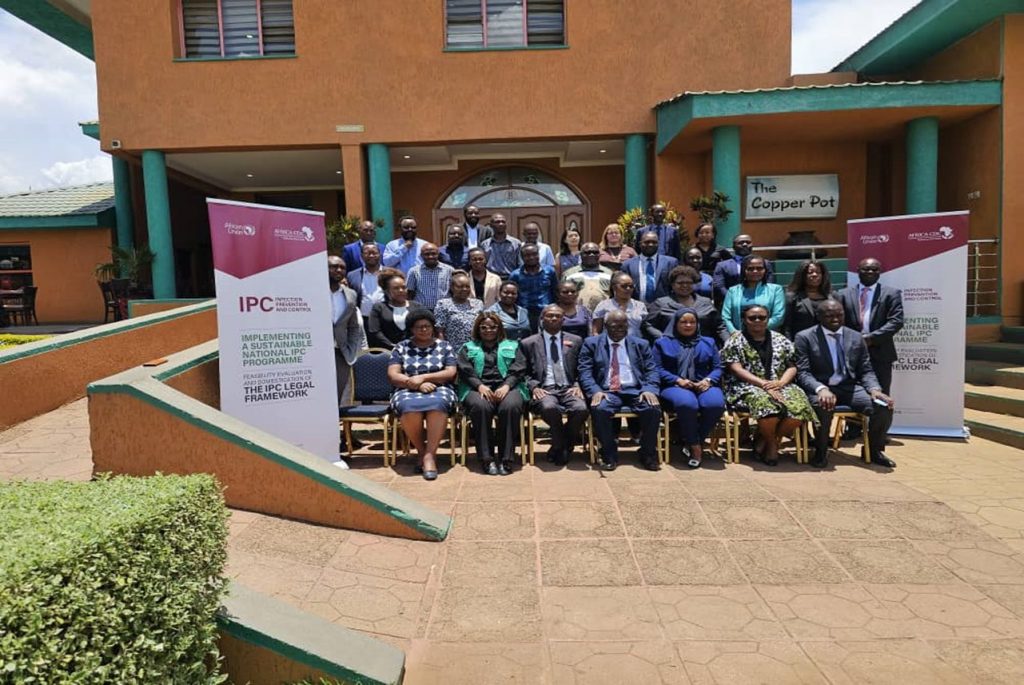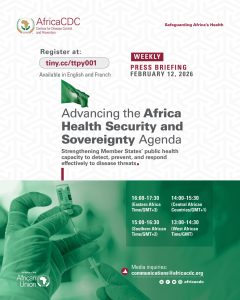The Africa Centres for Disease Control and Prevention (Africa CDC) has developed and endorsed a comprehensive Infection Prevention and Control (IPC) Legal Framework, marking a significant milestone in the region’s commitment to protecting public health and strengthening healthcare systems. This legal framework provides essential guidelines and regulations for preventing and controlling infectious diseases, promoting a safer and healthier future for the continent. The IPC Legal Framework involved collaboration among stakeholders, including policymakers, health experts, and legal professionals, ensuring its alignment with regional priorities and international standards and ensuring its alignment with regional priorities and international standards. By establishing a robust IPC legal framework, Africa is better equipped to respond to outbreaks and pandemics, safeguard the well-being of its people, and promote a healthier future for the continent.
Africa CDC is dedicated to supporting African Union Member States in implementing the IPC Legal Framework. Recognizing the life-saving potential of laws, Africa CDC actively promotes adopting and enforcing effective legal measures for preventing and controlling infectious diseases. Through financial, technical, and collaborative assistance, Africa CDC empowers countries to strengthen their legal frameworks, ultimately enhancing their ability to safeguard public health and mitigate the impact of outbreaks.
Africa CDC is in the process of implementing the IPC Legal Framework in Member States. It has so far supported four (4) Member States, including Cameroon, Liberia, Malawi, and Nigeria. In these workshops, a multisectoral approach is encouraged to collaborate, discuss, and strategise the effective implementation of the legal instrument. Cameroon, Liberia, Malawi, and Nigeria’s experiences can serve as case studies, providing valuable insights for African Union Member States. Through technical support and inclusive workshops, Africa CDC aims to strengthen infection prevention and control measures across the continent and foster a collaborative approach to implementing the IPC Legal Framework.
During the joint workshop held in Douala, Cameroon, between the Ministry of Health of Cameroon, Africa CDC, and the World Health Organization, significant progress was made towards establishing a sustainable national Infection Prevention and Control (IPC) program. The workshop outputs included a Legal Assessment report of the gaps, weaknesses, strengths, and opportunities of the IPC Legal Framework. In addition, it had the evaluation of the existing IPC program. It facilitated the drafting and implementation of an IPC legal framework, the development of the Monitoring and Evaluation Tools, and the development of standards for IPC. The report provides recommendations for enhancing IPC in Cameroon, such as forming an intersectoral task force, developing validated IPC standard operating procedures, and revising legal instruments to ensure clarity and effectiveness.
During the visit to Lilongwe, Malawi, the team assessed the feasibility of establishing a robust IPC Legal Framework. Activities included legal mapping, identifying gaps, and developing recommendations across six IPC domains. The conclusion emphasized amending the Public Health Act to establish the National IPC program with regulations for collaboration, national standards, education, surveillance, and compliance monitoring. Integration of Health Associated Infections (HAIs), surveillance, development of HAI SOPs, and mechanisms for regular evaluation of standards were proposed. The National IPC Operational Plan was presented for approval.
A collaborative IPC Legal Framework Assessment Workshop was held in Lagos, Nigeria, from 3rd to 9th December 2023 to enhance Infection Prevention and Control (IPC) practices. Participants reviewed and validated the IPC legal instrument analysis report, developed a draft IPC legal framework, and made amendments to the NCDC Act 2018. The workshop refined IPC standards, proposed regulations, and enforcement mechanisms through presentations, group work sessions, and constructive discussions. The outcome was a comprehensive IPC legal framework that will contribute to improved infection prevention and control measures across Nigeria, ensuring the protection of public health. Africa CDC has developed and endorsed an Infection Prevention and Control (IPC) Legal Framework to provide guidelines and regulations for preventing and controlling infectious diseases. The framework aims to strengthen healthcare systems and safeguard public health. By empowering countries to improve their legal frameworks and effectively implement the IPC Legal Framework, Africa CDC aims to enhance infection prevention and control measures continent-wide. Through these efforts, laws can save lives by promoting proactive measures, swift responses to outbreaks, and safeguarding the well-being of African individuals and communities.
For media enquiries please contact:
Dorothy Njagi | Senior Communication Officer- Communication & Public Information directorate | Africa Centres for Disease Control and Prevention| African Union| email: email: njagid@africacdc.org | Website: www.africacdc.org| Addis Ababa| Ethiopia| Facebook | Twitter







